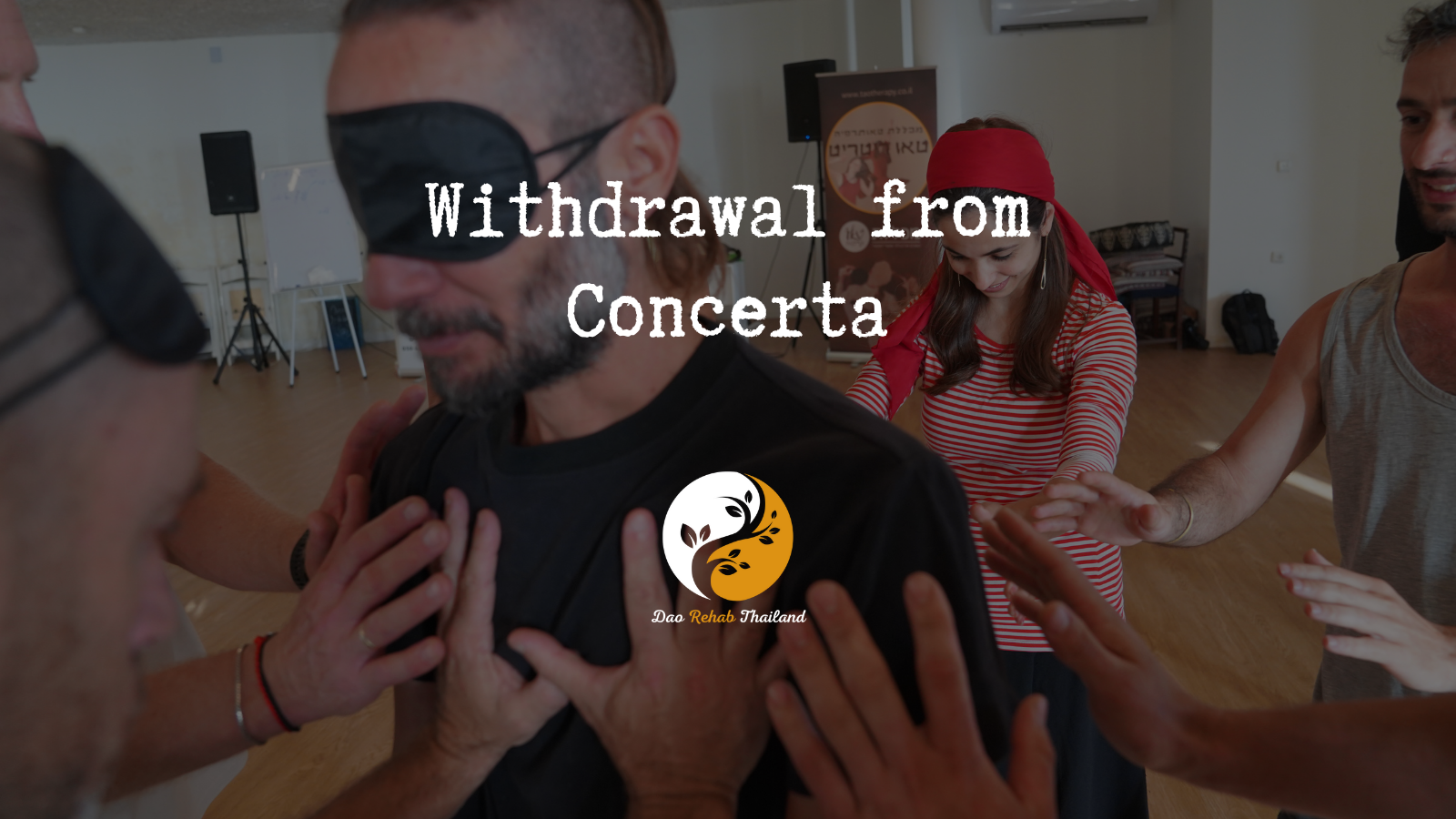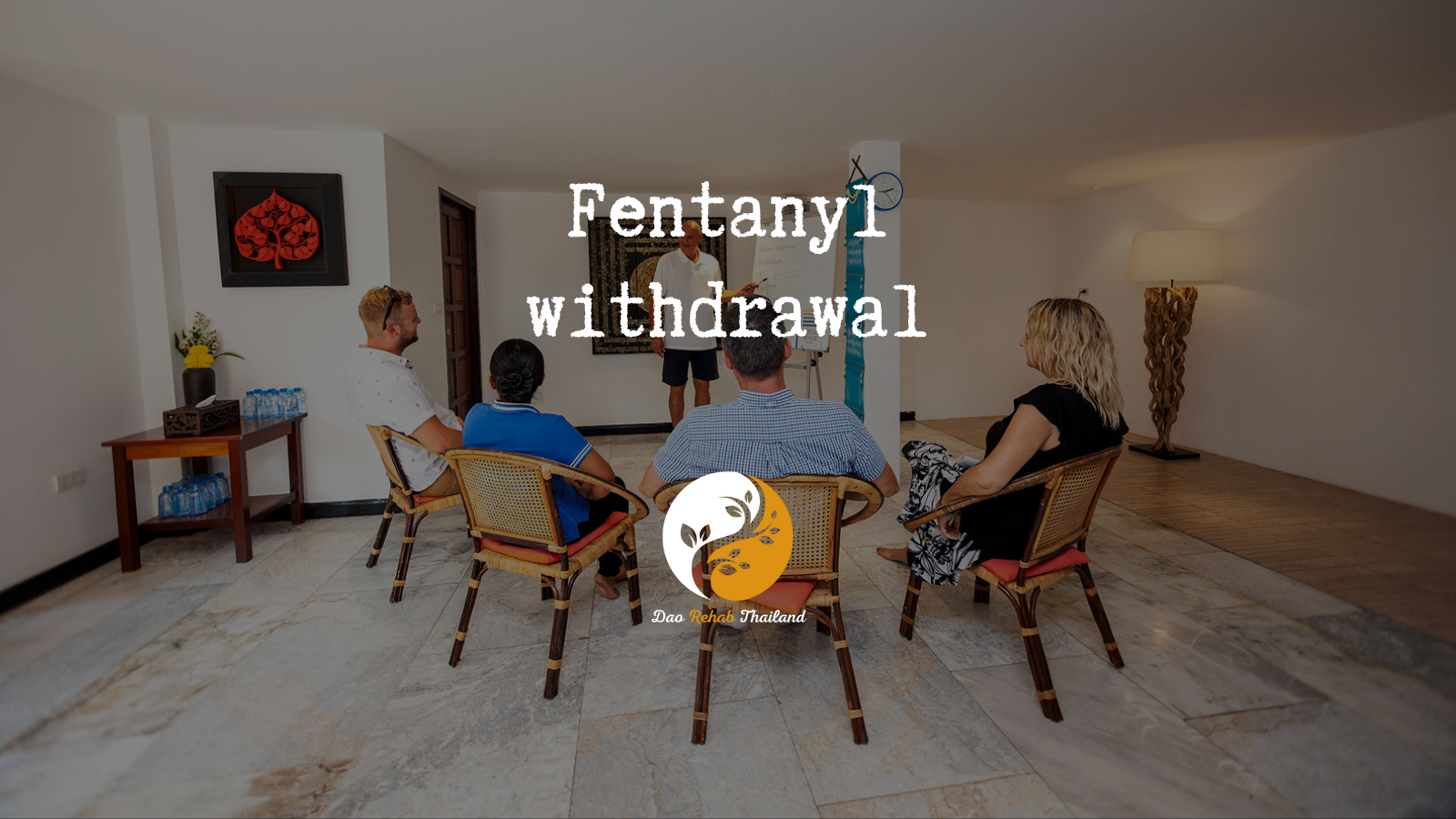
Withdrawal from Concerta-Holistic rehab in Thailand
Withdrawal from Concerta
“Turning the impossible into possible”

"Detox from Drugs at a Luxury Holistic Center in Thailand and Israel"

Withdrawal from Concerta
Concerta is a medication used to treat attention deficit hyperactivity disorder (ADHD). The active ingredient in the medication is methylphenidate, the same active ingredient found in Ritalin. Concerta is designed to be sustained-release, so it releases the active ingredient gradually throughout the day. Here is a detailed explanation of Concerta:
"Holistic Center for Trauma, Addiction, and Mental Imbalance Treatment in Thailand"
“Come to the beginning of your journey to freedom from addiction to alcohol, drugs, and pills, and rediscover your life within the serene embrace of DaoTherapy Rehab in Thailand—where holistic healing meets empowering recovery.”
DaoTherapy Holistic Rehab
Key Elements of Drugs Detox:
Medical Supervision: Drugs detox must be conducted under medical supervision, as the body may experience withdrawal symptoms. These can include nausea, anxiety, muscle aches, and insomnia. A medical team will monitor and manage these symptoms to ensure the patient’s safety and comfort.
Holistic Therapies:
Holistic Therapies: Many detox programs incorporate holistic therapies such as mindfulness, yoga, and meditation to help individuals cope with stress and anxiety during the detox process. These therapies support the mind-body connection and contribute to overall recovery.
Tapering Process
Tapering Process: Drugs detox often involves a gradual tapering of the drug to reduce withdrawal severity. Doctors will slowly decrease the dosage over time to allow the body to adjust to lower levels of the substance.
Psychological Support:
Psychological Support: Like any addiction recovery process, detox from Drugs includes psychological support. This can involve counseling, therapy, or support groups to address the mental and emotional aspects of addiction.
Post-Detox Treatment:
Post-Detox Treatment: After completing detox, continuing treatment is crucial to prevent relapse. This often includes participation in ongoing therapy, group support, and the development of new coping strategies to maintain sobriety.
The historical background of Concerta
Concerta is one of the most commonly used medications for the treatment of attention deficit hyperactivity disorder (ADHD), based on the active ingredient methylphenidate. Here is the historical background of the development of the drug:
Historical background of methylphenidate and Concerta
1. Development of methylphenidate:
1940s: Methylphenidate was first synthesized in 1944 by chemist Leon A. Fenichel in the laboratories of CIBA (now Novartis). The initial goal was to find a drug that could treat various disorders of the nervous system.
2. Initial approval:
1950s: Methylphenidate was first launched on the American market in 1955 under the trade name Ritalin. The drug was originally intended to treat depression, fatigue, and narcolepsy.
3. Use in the treatment of ADHD:
1960s: During the 1960s, it was discovered that methylphenidate was effective in treating children with attention deficit hyperactivity disorder (ADHD). This finding led to the wider use of Ritalin in the treatment of ADHD.
4. Development of Concerta:
1990s: With the development of technology and the understanding of the need for a sustained release of the drug to improve patient adherence and convenience, the pharmaceutical company Alza Corporation developed Concerta. Concerta was approved by the FDA in 2000 as a sustained release methylphenidate drug for the treatment of ADHD.
5. Innovation in sustained release:
Concerta uses OROS (Osmotic Release Oral System) technology, an osmotic release system that allows for a gradual and controlled release of the active ingredient over approximately 12 hours. This reduces the need to take medication multiple times a day and improves adherence to treatment.
Benefits and Innovations
1. Sustained Release:
Concerta’s osmotic system allows for a continuous and uniform release of the drug, providing a stable effect throughout the day and reducing fluctuations in blood drug levels.
2. Convenience of Use:
Once-daily dosing reduces the need to remember to take the drug multiple times a day, improving adherence and patient convenience.
Impact and Widespread Use
1. Expansion of Use:
Since Concerta’s approval, it has become one of the most commonly prescribed medications for the treatment of ADHD, both in children and adults. The drug is used to improve concentration, attention, and control impulsivity.
2. Further Research and Development:
Studies continue to test Concerta’s efficacy and safety, as well as its long-term effects. The drug has been approved in many markets around the world and continues to be an important part of the treatment of attention deficit hyperactivity disorder.
Taotherapy does not believe in drug therapy and does not believe that such a diagnosis exists in reality, but we bring you the latest information about Concerta, which is a drug developed to improve the treatment of attention deficit hyperactivity disorder through the delayed release of the active ingredient methylphenidate. The development of Concerta is based on years of research and experience in the use of methylphenidate, and it is a central part of modern ADHD treatment. The drug improves the ease of use and persistence in treatment, and provides an effective response to the needs of many patients around the world.
How it works
Concerta works by increasing the activity of certain chemicals in the brain, mainly dopamine and norepinephrine. These substances play a central role in the processes of attention, concentration and regulation of impulsive behaviors.
Features
1. Delayed release:
Concerta contains a unique release mechanism that allows the drug to be administered in a single dose per day. The drug releases the active ingredient in three stages, which allows for a sustained effect for about 12 hours.
The tablet structure consists of different layers of the drug, which break down and release the active ingredient gradually throughout the day.
2. Dosages:
Concerta is available in different doses: 18 mg, 27 mg, 36 mg, and 54 mg. The dosage is adjusted according to the patient’s needs and response.
Advantages
1. Convenience of use:
Due to the delayed release, Concerta is taken once a day, which reduces the need to take several doses throughout the day and improves comfort and adherence to treatment.
2. Sustained effect:
The sustained effect of Concerta allows for drug coverage throughout the day, which helps maintain concentration and attention throughout school or work hours.

contact us
Contact us with your questions
We would love to speak with you! Feel free to reach out with any questions.

get in touch
Schedule a free consultation
Schedule a free consultation with our team and let’s make things happen!
Side effects
Like any medicine, Concerta can cause side effects. Here is a list of the more common and serious side effects:
1. Common side effects:
– Decreased appetite
– Sleep problems
– Headaches
– Stomach aches
– Irritability
2. Serious side effects:
– Increased blood pressure and rapid heartbeat
– Psychiatric problems such as anxiety, depression, and aggression
– Rare allergic reactions, such as rash or difficulty breathing
Precautions
1. Medical monitoring:
You should follow your doctor’s instructions and be under regular medical supervision, especially at the beginning of treatment or when changing the dose.
2. Individualization:
The dosage and treatment are individualized according to the needs and response of the patient, and the dose should be changed as necessary.
3. Responsible use:
You should avoid abusing the medicine and take it only according to the prescription given by the doctor.
Summary
Concerta is an effective medication for the treatment of attention deficit hyperactivity disorder (ADHD), with a delayed-release mechanism that allows for a sustained effect throughout the day. The use of the medication requires medical monitoring and individualized dosage adjustment, and it is recommended to be aware of possible side effects and report any changes in your health to your doctor.
How to Abuse Concerta
Concerta (methylphenidate) abuse occurs when the medication is taken in a way that is not in accordance with your doctor’s instructions or for non-medical purposes, such as improving academic performance or experiencing euphoria. Concerta abuse can lead to addiction and serious side effects. Here are some ways in which addicts abuse Concerta:
Ways to Abuse Concerta
1. Taking a High Dose:
People may take higher doses than those prescribed by their doctor in order to increase the stimulating effect of the medication.
2. Change in the way of use:
Crushing and inhaling: Some users crush the tablets and inhale the powder through the nose. Inhaling the drug allows the drug to enter the bloodstream quickly and cause a faster and stronger effect.
Injection: The drug is dissolved in water and injected directly into a vein. Injection increases the stimulating effect but increases the risk of infections and damage to the blood vessels.
3. Use without a medical need:
People who do not have ADHD may use Concerta to improve their concentration and productivity at work or school. Using the drug for these purposes is considered abuse.
4. Combined use with other substances:
People may use Concerta together with other drugs, such as alcohol or other drugs, to increase the effect or relieve the side effects of other drugs.
Risks and side effects of abuse
1. Addiction:
Concerta abuse can lead to physical and psychological addiction. Users may feel a strong and constant need to use the drug and experience withdrawal symptoms when they try to stop.
2. Serious side effects:
Using high doses or using dangerous methods of use such as injection or inhalation can cause serious side effects such as heart problems, high blood pressure, anxiety, psychosis, and depression.
3. Physical harm:
Inhaling or injecting the drug can cause damage to the tissues of the nose, blood vessels, and heart, as well as a risk of infections and other diseases.
4. Psychiatric effects:
Concerta abuse can lead to psychiatric problems such as anxiety, depression, paranoia, and psychotic episodes.
Abuse prevention
1. Medical monitoring:
You should follow your doctor’s instructions and take the drug only in the doses prescribed. Regular medical monitoring can help identify abuse in time.
2. Education and awareness:
Raising awareness of the risks and side effects of Concerta abuse can help prevent addiction and misuse of the drug.
3. Support and treatment:
People struggling with Concerta addiction should seek professional help, including medical and psychological support, to overcome the addiction and recover.
Summary
Concerta abuse can lead to addiction and serious side effects. It is important to be aware of the risks and take action to prevent addiction through medical monitoring, education and awareness, and professional support and treatment. If you or someone you know is struggling with Concerta abuse, it is recommended that you seek professional help.
Concerta withdrawal
Withdrawal symptoms from Concerta (methylphenidate) can be varied and affect both the body and the mind. These symptoms can occur when the drug is stopped suddenly after prolonged use or in high doses. Here is a list of common withdrawal symptoms:
Physical withdrawal symptoms
1. Increased fatigue:
Feeling extremely tired and lacking energy. The patient may feel exhausted all the time and have difficulty performing daily activities.
2. Decreased appetite:
A change in appetite, often manifested by a sharp decrease in the desire to eat.
3. Headaches:
Frequent headaches or a feeling of pressure in the head.
4. Muscle aches:
Pain in muscles and joints, a general feeling of weakness in the body.
Mental and emotional withdrawal symptoms
1. Depression:
– Feelings of sadness or deep depression, feelings of hopelessness and a general decline in mood.
2. Anxiety:
– Increased feelings of anxiety and tension, irritability and feelings of aggression.
3. Mood swings:
– Sharp mood swings, emotional instability.
4. Difficulty concentrating:
– Difficulty concentrating or performing simple tasks, decreased cognitive function.
5. Cravings:
– A strong need to use Concerta again, including persistent thoughts about the drug.
Behavioral withdrawal symptoms
1. Fatigue and lack of motivation:
– Feelings of fatigue and lack of motivation to perform daily activities, a general decrease in energy levels.
2. Social isolation:
– Withdrawal from people and social activities, a tendency to isolate.
Managing Withdrawal Symptoms
1. Medical Monitoring:
– It is important to undergo the withdrawal process under medical supervision. Your doctor can help manage withdrawal symptoms and adjust your treatment as needed.
2. Psychological Support:
– Psychological therapy or counseling can help deal with the emotional and mental changes, provide support, and offer tools to manage symptoms.
3. Social Support:
– It is important to get support from family, friends, and support groups. Social support can make the withdrawal process easier.
4. Lifestyle Changes:
– Maintaining a healthy lifestyle, including a balanced diet, exercise, and adequate sleep, can help cope with withdrawal symptoms.
5. Relaxing Activities:
– Practicing meditation, yoga, or other techniques to relax the body and mind can be helpful.
Summary
Concerta withdrawal symptoms can be challenging and include physical, mental, and behavioral symptoms. It is important to go through the withdrawal process under medical supervision and receive appropriate support to make it easier to cope with the symptoms and achieve full rehabilitation. If you or someone you know is struggling with Concerta withdrawal, it is recommended to seek professional help.
Psychological Support:
Psychological Support: Like any addiction recovery process, detox from Subutex includes psychological support. This can involve counseling, therapy, or support groups to address the mental and emotional aspects of addiction.
Review of the concerta in the world
Concerta, like other medications for attention deficit hyperactivity disorder (ADHD), has been criticized for several reasons. Here are some of the main points of criticism of Concerta worldwide:
1. Side effects
Physical: Side effects such as decreased appetite, sleep problems, headaches, stomachaches, and weight loss are among the most common complaints.
Mental: Psychiatric side effects include anxiety, depression, aggression, and sometimes psychosis.
2. Abuse and addiction
Risk of addiction: Methylphenidate, the active ingredient in Concerta, is a stimulant that can be addictive. There is concern about abuse of the drug, especially among young people and students trying to improve their academic performance.
Illegal access: There have been reports of illegal sale and distribution of Concerta among schoolchildren and college students.
3. Overdiagnosis and Overuse
Overdiagnosis: There are claims that too many children and adults are being diagnosed with ADHD and prescribed medications like Concerta.
Overuse: Concerns that stimulant medications are being prescribed as a quick and easy solution to behavior and concentration problems, rather than seeking other solutions such as behavioral therapy or lifestyle changes.
4. Long-term effects
Unknown effects: More research is still needed on the long-term effects of Concerta use, especially when the drug is started at a young age and taken for many years.
5. Impact on child development
Impact on growth: Some studies suggest that long-term use of Concerta may affect children’s growth, especially in terms of height and weight.
6. Ethical and social issues
Peer pressure: There are claims that there is peer pressure for parents and teachers to prescribe medications to children to improve their performance in school.
Stigma: The use of psychiatric medications may lead to stigma among children and adults treated with Concerta.
Summary
The criticism of Concerta reflects a wide range of medical, ethical, and social concerns. While Concerta is an effective medication for many ADHD patients, it is important to continue to study its long-term effects, use it responsibly, and be aware of its side effects and potential risks. It is also important to continue to seek holistic and complementary solutions to treat ADHD to ensure the health and well-being of patients.
Thought provoking questions:
1. Have you ever felt that you live in constant fear? What was the main reason for this?
2. How did you feel when you realized that the fear comes from the mind and is not real? Did it change your perspective?
3. Have you tried to apply these ideas in your life? What were the main challenges?
4. From the awareness experience for you? How is it different from the normal experience of life?
5. How do you intend to take responsibility for realizing awareness in your life from now on?








